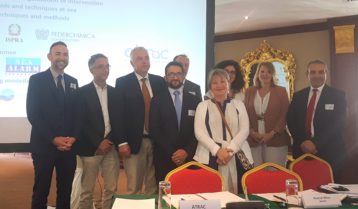
Sea Alarm shares oiled wildlife response good practice messages with Regional Sea Conventions
Sea Alarm recently presented at the annual meetings of three Regional Sea Conventions on the importance of the EUROWA project and the Self-Assessment Tool in improving oiled wildlife response preparedness.
In May, Sea Alarm participated in the 2019 Meeting of the Working Group on Operational, Technical and Scientific Questions Concerning Counter Pollution Activities (OTSOPA) of the Regional Sea Convention for the North Sea (Bonn Agreement) in Southampton, UK.
In June, Sea Alarm was involved in the 26th Annual Meeting of the HELCOM Response Group of the Regional Sea Convention for the Baltic Sea (Helsinki Convention) in Warsaw, Poland, and also the 2019 Focal Points Meeting of the Regional Marine Pollution Emergency Response Centre (REMPEC) of the Regional Sea Convention for the Mediterranean Sea (Barcelona Convention) in Valletta, Malta.
Sea Alarm’s Paul Kelway, attended the events and presented on Sea Alarm’s behalf, providing updates on the EURopean Oiled Wildlife Assistance (EUROWA) initiative and the application of Sea Alarm’s Self-Assessment Tool (SAT 2.0) for evaluating wildlife response preparedness.
Building on the EU-funded EUROWA project (2015-16) which developed agreed training standards and operational guidance documents for oiled wildlife response in Europe and the successful mobilization of EUROWA-affiliated responders in the Bow Jubail oiled wildlife response in Rotterdam in 2018, Sea Alarm hopes to formally establish EUROWA as an international resource for mutual assistance in Europe.
The next step in this process is to create appropriately funded national preparedness programmes which allow experts from various countries to attend training and exercise events organised under the EUROWA umbrella. In this way, these internationally trained and qualified experts can work more effectively together in assisting a country challenged by an oiled wildlife incident. For more information on this please see the latest EUROWA article.
Progress on the adoption of the SAT 2.0 was also on the agenda. It was encouraging to note that both HELCOM and OTSOPA Contracting Parties are actively using the Sea Alarm tool to report on their status. In addition, four countries of the Western Mediterranean region Marine Oil & HNS Pollution Cooperation (WestMOPoCo) project—France, Italy, Algeria and Tunisia — have also utilised the tool, as a pilot project, to evaluate their level of preparedness.
Sea Alarm shared the WestMOPoCo results at the REMPEC Focal Points Meeting 2019. Whilst preparedness levels are relatively low in some countries, the insight those countries gained from working with the SAT 2.0 will help their authorities to focus on aspects most in need of improvement, and to monitor their progress in making those improvements. It is Sea Alarm’s hope that SAT 2.0 will be more widely adopted by contracting parties within the Mediterranean region as a method for more effectively supporting ongoing wildlife response preparedness activities.
Also during the REMPEC meeting, Sea Alarm took part in a signing ceremony sealing an agreement with the sixth member of the Mediterranean Assistance Unit (MAU), the Adriatic Training and Research Centre for Accidental Marine Pollution (ATRAC). The MAU, is a select group of oil spill response organisations that can be activated by the Head Office of REMPEC, upon the request of a Mediterranean coastal state, to provide expertise in the event of an incident. In addition to Sea Alarm and ATRAC, MAU agreement holders include the Centre of Documentation, Research and Experimentation on Accidental Water Pollution (CEDRE), the Italian Federation of the chemical industry (FEDERCHIMICA), the Italian Institute for Environmental Protection and Research (ISPRA), and the Mediterranean Operational Network for the Global Ocean Observing System (MONGOOS).
Sea Alarm wishes to thank the contracting parties of these conventions for the opportunity to attend and present at these important meetings, and looks forward to continuing cooperation in advancing oiled wildlife preparedness and response.
Photo credit: REMPEC



